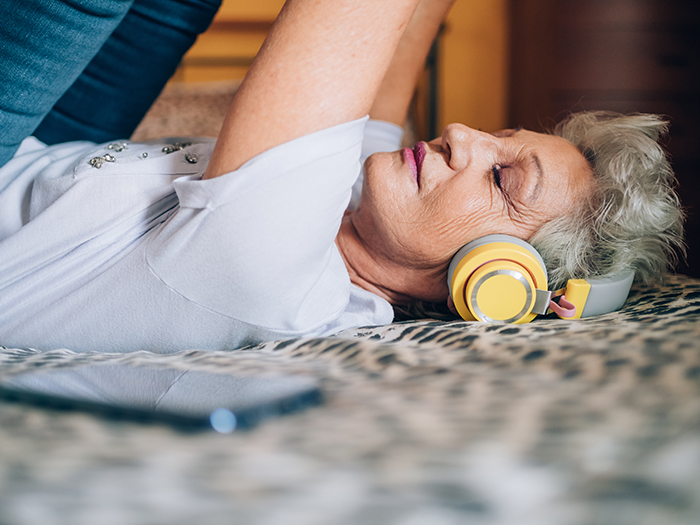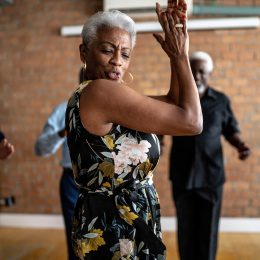8 Ways Therapists Cope on Their Hardest Days
Next time you’re feeling blue, try one of these coping strategies from experienced mental health pros.

This article is part of the SilverSneakers Whole-Body Wellness Challenge, which is rooted in the understanding that health isn’t just about fitness. We’re sharing fun and easy ways to bring everything you love about SilverSneakers classes and your time at the gym to other areas of your life. You’ll find workouts, tips, and activities to help you build strength, eat healthier, sleep sounder, and be more present in your life so you can feel good—body, mind, and spirit.
Every day, therapists help their patients reduce stress, work through tough times, and set boundaries. And while therapists are trained in the best ways to deal with mental health issues, that doesn’t mean they never struggle themselves.
Mental health professionals deal with the same relationship issues, financial worries, and time crunches as everyone else, and they also have a mentally and emotionally taxing job. Fortunately, they know what to do when times get tough. And it usually starts with a gut check (sometimes literally).
“I know I’m feeling stressed when I’m tired, when I’m obsessing over problems and not coming up with solutions, and when I have digestive upsets,” says Virginia Gilbert, L.M.F.T., a marriage and family therapist with a practice in Los Angeles. “That’s when I make a plan for what I’m going to do about it.”
What does that plan usually look like? Here, Gilbert and three other experienced therapists share the strategies they use to make tough times feel a little easier. Perhaps they will work for you too.
Add SilverSneakers to your wellness routine. Classes and events are happening right now at participating gyms, online through SilverSneakers LIVE, and at community centers near you. Activate your free online account to get started.
Coping Strategy #1: Clear the Calendar
It’s not always possible to simply step away from your obligations. But when therapists feel themselves getting stressed, they know it’s time for a break.
“I’m pretty in tune with my body and my emotional world, so when I notice I’m not sleeping as well or I’m having a difficult time settling down in my off time, I take it as a cue from my body that I need to take a day off to unwind,” says Andrew Lima, Psy.D., a clinical psychology postdoctoral fellow with the Manhattan Psychology Group.
Darin Bergen, Psy.D., a clinical psychologist in Portland, Oregon, is proactive about optimizing his schedule. “I know what my limit is for how many clients I see each day and per week, and I keep my schedule to that,” he says. “It allows me to stay healthy, and I can give myself fully in my sessions.”
The lesson for all: Never feel guilty about putting your needs first, even if it means canceling plans. It helps you show up as the best version of yourself when you do want (or need) to be there.
Coping Strategy #2: Meditate—Even for Five Minutes
Bergen carves out time every night before bed for meditation and reflection. It can be as simple as spending a few minutes in a distraction-free space, focused solely on your breathing.
Research shows that meditation may help your mind and body in many ways. Benefits include less stress and anxiety, lower risk of memory loss, better focus, lower blood pressure, and improved sleep. Many experts also recommend meditation to help cope with grief or to tame inflammation.
If you’ve never tried meditation before, this three-minute video is a great place to start.
Coping Strategy #3: Spend Time with Your People
Spending time with friends and family and fostering close relationships is a must for the therapists we interviewed.
“I do my best to be around people who are positive and make me laugh every day,” says Nancy Irwin, Psy.D., a clinical psychologist in Los Angeles.
Emails, texts, and FaceTime may make it easier to stay connected from afar, but nothing beats seeing your friends and family in person when possible. Research from the Journal of the American Geriatrics Society found that people who saw friends or loved ones at least once or twice per week were substantially less likely to be depressed than those who had those sorts of interactions only once or twice a month.
If your social circle seems a bit lacking, don’t be afraid to branch out. It’s never too late to make new friends (this four-step plan tells you how).
Coping Strategy #4: Exercise
You know exercise is good for your health, although the mental benefits are often overshadowed by the physical perks. But exercise is a proven stress buster—it reduces levels of stress hormones like cortisol and adrenaline and boosts brain chemicals like endorphins that make you feel relaxed and upbeat.
“As a psychologist who treats trauma predominantly, I have to guard against compassion fatigue or burnout,” Irwin says. “I do that with physical exercise.” For her, that means running, walking, weightlifting, swimming, or ballet classes.
Lima also makes moving his body a priority. He intentionally keeps his mornings and evenings free so that he can go on walks. “I will often leave my headphones at home and try to focus on the sounds of birds chirping and wind rustling, to help myself stay in the present moment,” he says.
Coping Strategy #5: Pamper Yourself
Pedicures and haircuts aren’t just about looking spiffy; they’re a form of self-care, which is anything you do to preserve your own health and well-being. For Gilbert, eating well, getting enough sleep, and cultivating a mindfulness practice are musts, along with an occasional pampering pedicure.
It doesn’t matter exactly what you do; anything that makes you feel good and is outside the realm of chores or basic personal hygiene (taking a shower, for instance) is worth trying. One budget-friendly idea: Light some candles and cozy up with a great book and a cup of coffee or tea.
Coping Strategy #6: Get Lost in a Song
Subscribe to our newsletter
It's quick and easy. You could be one of the 13 million people who are eligible.
Already a member? Click to discover our 15,000+ participating locations.
Follow Us
Listening to music can be calming for many people, including Bergen. “Music is really important to me, and I use it consciously to help with stress,” he says. “I also listen to music on my commute to and from work to help me separate my work life from my home life.”
Music may be especially helpful if stress or anxiety is hurting your sleep. According to a study from Semmelweis University in Budapest, Hungary, playing relaxing classical music in the background improves sleep quality—so you wake up feeling well rested. If you want to try it, simply turn on classical music at a low volume as you settle into bed.
Coping Strategy #7: Talk to a Therapist (Even if You Are One Yourself)
Therapists don’t just talk the talk, many of them also walk the walk by seeing a therapist themselves. “As a therapist, engaging in therapy is vitally important, not just for dealing with stress and taking care of your own mental health, but also to help you more fully understand what patients go through on the couch,” says Lima.
Therapy can help anyone deal with whatever challenges they’re facing, regardless of whether they have a mental health condition. If you’re interested in trying it, check with your health plan for benefits and network information, or check what Medicare covers for outpatient mental health care at medicare.gov.
You may also want to check out the American Psychological Association locator tool to find a licensed psychologist near you.
Coping Strategy #8: Biofeedback
Stress management is one of Lima’s specialties, and he makes use of a technique he uses with many of his own patients called biofeedback training.
During a biofeedback session, electrical sensors placed on the body provide information about your heart rate, breathing, muscle contractions, temperature, and more. You can then use that information to help you learn to control your body, by doing things like making subtle changes that promote relaxation.
“I practice biofeedback daily as a way to center myself and make my work more effective with my patients,” Lima says.
While there are biofeedback devices available for home use, it’s best to discuss options with your doctor or therapist first, as it might not be appropriate for everyone.
Activate Your FREE SilverSneakers Online Account
Get hundreds of free SilverSneakers On-Demand videos and stay in touch with us by creating your free online account. You don’t have to be a SilverSneakers member to get on-demand workout videos, health and fitness tips from SilverSneakers, and more.
SilverSneakers members can go to thousands of nationwide gyms and fitness locations, plus take SilverSneakers LIVE online classes led by specially trained instructors and designed for all fitness levels and abilities – at no additional cost. If you have a Medicare Advantage plan, it may include SilverSneakers. Check your eligibility here.
Already a member? Get your SilverSneakers member ID, search for locations near you, and all the health and wellness resources you need by logging in to your online member account here.





